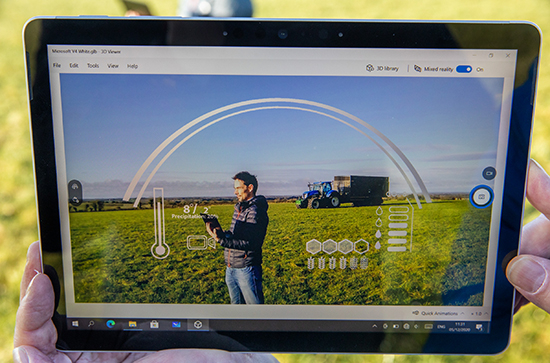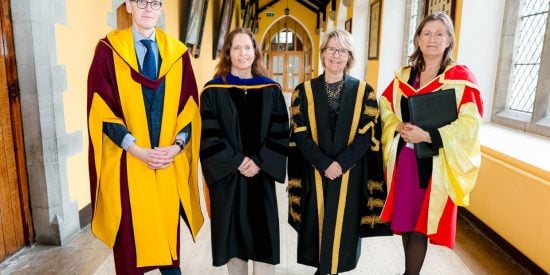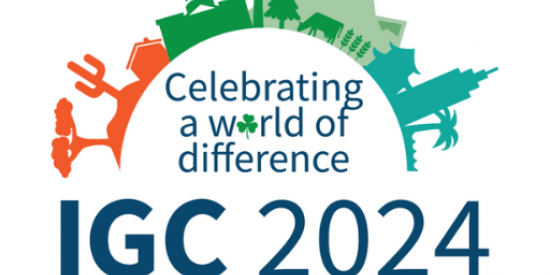Dr Rowan Fealy of Maynooth University. Photograph: Naoise Culhane
Tuesday, December 15, 2020 - 09:30
Ambition to share insights and models with other countries to help reduce global carbon outputs
Microsoft Ireland and SFI (Science Foundation Ireland) today announced the co-funding of a €5m climate change project in collaboration with Maynooth University. The project, called Terrain-AI, will focus on improving our understanding of the impact of human activity on land use and how it relates to climate change. The research will initially focus on test sites in Ireland, with the ultimate aim of reducing global carbon levels by sharing the insights and models developed with other countries.
Leveraging the latest multimodal sensing technologies, IOT devices and the Microsoft Azure Cloud, the project will build artificial intelligence (AI) models that can inform more effective and sustainable management practices, leading to significant carbon reduction. The project led by Maynooth University will also be conducted in collaboration with Teagasc, Trinity College Dublin, University College Dublin, Dublin City University, and University of Limerick.
Data will be captured from satellites, airborne platforms, as well as in-field instruments, from 14 test sites strategically located across Ireland. To ensure a broad representation of land usage, and to improve our understanding of the interactions between the land and human activities that lead to carbon emissions, the test sites will include all types of land from grasslands, croplands, forestry, wetlands, peatlands, to urban areas.
Research in this area to date has focused on individual land use types, or activities relating to a specific sector. However, this project will integrate insights and data from multiple land types and multiple sectors into a modelling framework that will inform more effective policies to reduce carbon emissions. It will also help to inform future land use practices that will achieve reduced carbon outputs such as, precision farming, carbon sequestration of grassland, and new approaches to public transport, or even tree planting in urban areas.
While the project is capturing data from land types in Ireland, the intention is to design a cloud platform that can use the insights from the Irish findings and be shared with other countries to help them explore land usage and carbon reduction in their own jurisdictions.
Welcoming the commencement of the research Minister for Further and Higher Education, Research, Innovation and Science, Simon Harris, TD, said: “I am delighted to announce the funding for this important new climate change research project in Ireland. I congratulate all the partners for coming together, particularly Microsoft Ireland for supporting the project with SFI - collaboration is at the core of research and innovation. This ambitious innovative research has the potential to significantly improve our knowledge and through that assist us to reduce our carbon emissions. I look forward to seeing the outcomes and learnings from the project as they arise and wish all involved every success.”
Prof Mark Ferguson, Director General, SFI and Chief Scientific Adviser to the Government of Ireland, said: “We are delighted to be supporting this important new research that seeks to address the challenging topic of Climate Change. I congratulate all of the partners for coming together to address this important area; the establishment of the testbed will create important knowledge that will assist Ireland to meet international obligations for carbon reduction. I’m sure the project will create significant impact and knowledge, and I thank Microsoft for supporting the project.”
Cathriona Hallahan, Managing Director of Microsoft Ireland remarked: “Microsoft has been carbon neutral across the world since 2012 and is committed to achieving carbon negative status by 2030. We seek to promote sustainable development and low-carbon business practices through the use of cloud-enabled technologies. Building on our recent initiative with Teagasc, and the delivery of Airband to help the farming community to stay connected, this project will explore how we can leverage technology to reduce carbon emissions across different land types.
“This is a great opportunity for Ireland to demonstrate leadership in climate change, as we look to share the findings and models developed during this research with our colleagues globally, so that we can all work together to reach our global carbon reduction targets.“
Prof Ray O’Neill, Vice President of Research and Development at Maynooth University said: “Maynooth University is delighted to lead this timely climate change project, bringing its strong, international research record to the consortium in key R&D areas of Earth Observation, Geocomputation and Climate Modelling. Terrain-AI demonstrates how academia and industry can come together to tackle the big global challenges.
“Tackling climate change is about changing everyday work patterns, activities and behaviours. The Terrain-AI project will collect high quality data, extract verifiable information and generate the facts to enable society make informed decisions about changing how we manage our climate and environment. We are delighted to collaborate in this landmark project with Microsoft and SFI, and our academic and industry partners, to help inform more effective and sustainable land use practices to decarbonising our economy.”
In conclusion, James O’Connor, Managing Director of Microsoft International Operations, said: “Building on our long-standing relationship with SFI, we are delighted to launch this exciting new initiative with Maynooth University, that will deliver unique insights to help landowners and planners make better informed decisions to reduce carbon emissions. Leveraging the latest in AI and IoT technologies, and by sharing the insights and framework with other countries, we can collectively find new solutions to reduce carbon emissions globally and effectively deliver a net zero future together.”
Notes to Editors
Further Background on the Terrain-AI Project
The research will be carried out by Maynooth University and led by Dr Rowan Fealy of the ICARUS Climate Research Centre, and Prof Tim McCarthy of the National Centre for Geocomputation.
Other key collaborators include government departments: Department of Agriculture, Food and Marine, Department of Transport, government agencies including the Environmental Protection Agency, Met Éireann, National Parks & Wildlife Service, National Transport Authority, Transport Infrastructure Ireland, Marine Institute and Ordinance Survey Ireland as well as Dublin City Council. Irish Industry will also be collaborating with inputs from Coillte, Bord na Mona as well as technology SME companies; Treemetrics, Icon Group, Net Feasa and Anuland.











